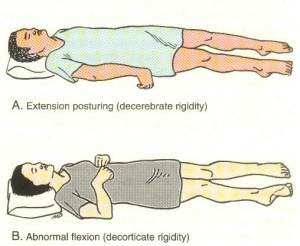Hypertonicity vs spasticity: Difference between revisions
No edit summary |
Evan Thomas (talk | contribs) mNo edit summary |
||
| Line 2: | Line 2: | ||
'''Original Editors '''- [[User:Saeed Dokhnan|Saeed Dokhnan]] | '''Original Editors '''- [[User:Saeed Dokhnan|Saeed Dokhnan]] | ||
'''Top Contributors''' - {{Special:Contributors/{{FULLPAGENAME}}}} | '''Top Contributors''' - {{Special:Contributors/{{FULLPAGENAME}}}} | ||
</div> | </div> | ||
[[Image:Decorticate.jpg|right|300px]]Hypertonicity or spastic dystonia is a continual increase in the muscle tension compared to normal resting tension, regardless of movement. It is dependent upon afferent information from feedback following movements of stretch. Decorticate and decerbrate rigidity are a form of spastic dystonia. Spastic dystonia is considered to be a form of sustained efferent muscular hyperactivity, dependent on continuous supraspinal drive to the alpha motor neuron. <ref>Clinical evaluation and management of spasticity, Jeffery et. al.2002</ref> | == Hypertonicity or Spastic Dystonia == | ||
[[Image:Decorticate.jpg|right|300px]]Hypertonicity or spastic dystonia is a continual increase in the muscle tension compared to normal resting tension, regardless of movement. It is dependent upon afferent information from feedback following movements of stretch. Decorticate and decerbrate rigidity are a form of spastic dystonia. Spastic dystonia is considered to be a form of sustained efferent muscular hyperactivity, dependent on the continuous supraspinal drive to the alpha motor neuron. <ref>Clinical evaluation and management of spasticity, Jeffery et. al.2002</ref> | |||
<br> | <br> | ||
| Line 43: | Line 44: | ||
<references /> | <references /> | ||
[[Category:Cerebral_Palsy | [[Category:Cerebral_Palsy]] [[Category:Neurology]] [[Category:Neurological_Conditions]] | ||
Revision as of 07:36, 28 August 2017
Original Editors - Saeed Dokhnan
Top Contributors - Saeed Dokhnan, Laura Ritchie, Lucinda hampton, Admin, Aya Alhindi, Evan Thomas, Scott Buxton, Kate Sampson and Kim Jackson
Hypertonicity or Spastic Dystonia[edit | edit source]
Hypertonicity or spastic dystonia is a continual increase in the muscle tension compared to normal resting tension, regardless of movement. It is dependent upon afferent information from feedback following movements of stretch. Decorticate and decerbrate rigidity are a form of spastic dystonia. Spastic dystonia is considered to be a form of sustained efferent muscular hyperactivity, dependent on the continuous supraspinal drive to the alpha motor neuron. [1]
| [2] |
Spasticity[edit | edit source]
Spasticity is a velocity-dependent increase in muscle tone in response to passive movement. Pyramidal tract injury doesn't give rise to spasticity. Rather, the main symptoms are weakness and loss of dexterity which is greater in distal than in the proximal muscles. The pyramidal tract is the system which balances muscle tone.
| [3] |
Neural Component of Spasticity[edit | edit source]
- Dorsoreticulospinal tract (DRT) - has an inhibitory effect on MRT and VST
- Medial reticulospinal tract (MRT) and Vestibulospinal tract (VST) - have a facilitatory effect on extensor tone.
All three systems are thought to inhibit flexor reflex afferents responsible for flexor spasm.
| [4] | [5] |
References[edit | edit source]
- ↑ Clinical evaluation and management of spasticity, Jeffery et. al.2002
- ↑ AriseandShineTherapy. What is Muscle Tone?. Available from: http://www.youtube.com/watch?v=YNnwf_XbRac [last accessed 29/08/16]
- ↑ brezzyana4's channel. Spastic Diplegia (Cerebral Palsy) 17 months old. Available from: http://www.youtube.com/watch?v=c-CV6dYNXsw [last accessed 29/08/16]
- ↑ Steffan Rasmussen. The Pathophysiology of Spasticity - Dystonia and its Difference From Spasticity [3/8]. Available from: http://www.youtube.com/watch?v=nann4fCB6HQ [last accessed 29/08/16]
- ↑ Steffan Rasmussen. The Pathophysiology of Spasticity - What Determine Muscle Tone and what Causes Spasticity [4/8]. Available from: http://www.youtube.com/watch?v=THPdi5KSVVk [last accessed 29/08/16]







